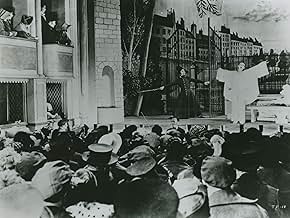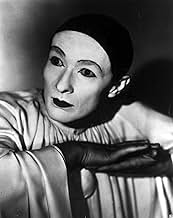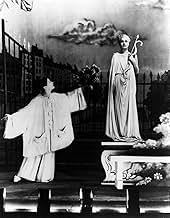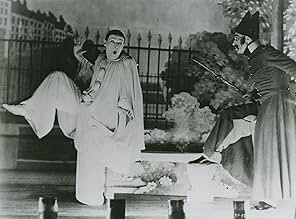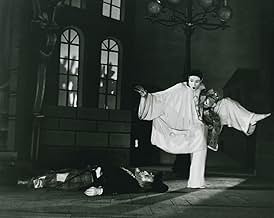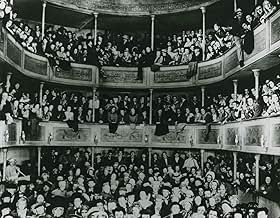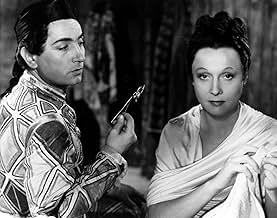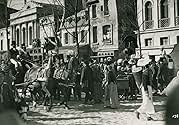AVALIAÇÃO DA IMDb
8,3/10
22 mil
SUA AVALIAÇÃO
A vida teatral de uma bela cortesã e dos quatro homens que a amam.A vida teatral de uma bela cortesã e dos quatro homens que a amam.A vida teatral de uma bela cortesã e dos quatro homens que a amam.
- Indicado a 1 Oscar
- 2 vitórias e 1 indicação no total
María Casares
- Nathalie
- (as Maria Casarès)
Palau
- Le régisseur des Funambules
- (as Pierre Palau)
Etienne Decroux
- Anselme Debureau
- (as Étienne Decroux)
Jane Marken
- Mme Hermine
- (as Jeanne Marken)
Raymond Rognoni
- Le directeur du Grand Théâtre
- (as Rognoni)
Avaliações em destaque
Les enfants du paradis is the masterpiece of the duet Carré-Prévert. Although I did not enjoy it as much as Renoir' s work, it must be said of course that it is one of the biggest and most ambitious and most elaborate films ever made in France. Technically I was amazed by the huge sets of the beginning representing the city of Paris in the XIX century (le boulevard du Temple) and set in Nice, and the camera movements within the crowd. We have indeed to take into account the awful conditions in which the film was shot: under occupied France and in co-production with an Italian company that retired when Sicily was occupied, in the mid-shooting. (Colin Crisp) Les enfants du paradise is for me a magnificent, huge story; it is for the cinema what Balzac and Victor Hugo were for literature in the XIX century; not only French, but the world's. A colossal masterpiece with a desperately long, elaborate plot and well-defined powerful characters that confront each other trying to find out in their intercourse the answer to metaphysical questions about love and life between fantasy and reality, just as Armes suggests. Les enfants du paradis boasts an entire collection of characters that make up a twisted action as a result of the confrontation of their personal characteristics. Baptiste Deburau, a real-life mime of the XIX century is the main character. As pointed out in class, many Freudian interpretations have been made about this character: he is weak, he is unable to reach his desires (Garance), he does not want to accept the love he already has (the girl who desperately loves him), he is not a hero, but the very opposite: someone who deserves the pity of the spectator; but also that of Garance and that of his public: when he acts as a mime, the character (as usual) is always chased by fatality and sadness. He even wanted to commit sucide! Garance is a simple woman, as she says in the film. She is ambiguous. Some (the Cinemania magazine in Spain, for example) see her as a prostitute (remember the place where she used to work, her flair, or the strange character she was with and who accused her of stealing his watch -a client, a pimp?). Whatever she may be, she is a lonely woman looking for a lonely love. The four main characters of the film are in love with her, but in a different way each. Each one takes her in the way they want her to be -we see her in the arms of Lemaitre or the Count as though she was two different persons-, except for Baptiste, who at the end of the film will realize and chase his true love -although we do not know what happens at the end. Lemaitre is the man, the Don Juan, the witty, attractive and winning beloved artist. He is proud of himself and his public is proud of him. He provides some talented moments of witty puns or funny, twisted scenes -like the one in the theatre. But there are two things that he cannot obtain: absolute art, in his own opinion only Baptiste has the genius; and absolute love, Garance, who she will love but only one night. However, he can manage it all, he is a scrounger and he will still enjoy his life as it comes. Lacenaire is an ominous, dark mixture of Lemaitre and Baptiste. He is proud as Lemaitre but triumph has cheated him -he is completely awkward as a writer. And he is resentful and sad as Baptiste. These two lead him into violence against his love, Garance and against the Count -I really enjoyed the scene of the murder: the close-up and the grimace of Avril- which can also. The murder can also be taken as a rebellion of the resentful lower classes against the upper classes: the image of the fallen, dead hand with the valuable ring is significant. The count is a symbol for the upper classes: childish (his hairstyle, his expression are those of a young boy), whimsical, materialist, stuck-up, posh, he thinks he can achieve the love of Garance thanks to his influences (he saves her from the police) and wealth (notice the rich veil Garance wears at the beginning of L'homme blanc. But he will lose everything by hands of Lacenaire. Finally, I liked the character of the girl who is in love with Baptiste. She really reminds me of Éponine form Les Misérables by Hugo, the unrequited young girl in love with Marius, the main character. She wanders alone through the film, seeking the love of Baptiste, without success. And she plays the lead in one of the most bitter scenes in the film, about which we will talk later.
The main topics in the film are love on one side and life between fantasy and reality on the other. Love is always present in various forms. A passionate love by Lemaitre, a platonic love by Baptiste, an unrequited love by the girl who loves him, a love bought with money, by the Count, a violent love, by Lacenaire. But Carné and Prévert really want to show that only a true, pure and simple love will prevail. That is the love Garance seeks and that only Baptiste will be able to give her at some point. 'Love is so simple' is one of the climax phrases, containing the key of love in the movie will first pronounced by Garance and later by Baptiste. However, there are some other bitter moments on the dark side of love: at the end of the film, when Garance flees and Baptiste chases her, his wife will stand alone, in the middle of the room, still. The camera will stay with her, and we can see her reaction, that of a little child so suddenly and badly struck by betrayal. 'What about me?' So simple words that however struck me. There is in the movie a constant game between life and theatre. This has a lead role throughout both parts of the movie. We can see gorgeous and funny sketches by Baptiste (right at the beginning, when he meets Garance, and later on his performances), and burlesque or sublime representations by Lemaitre. And in general a whole bunch of characters form the theater life will show off in the movie, and theater life itself can be seen in a close-up: the owner of the theater des Funambuls, the three authors (victims of a bitter criticism and humor), the side characters. However, the climax of this close relationship between theater and life arrives in the scene where Lemaitre, who knows he can do whatever he wants on a stage, as he is a superstar, strays from the script and begins fooling around. He goes out to the stalls and then action bends over itself, and does not depend on the authors any longer: the double game actor-spectator, fiction-reality reflexes itself in a witty dance. And Lemaitre leads us in the confusion, what is real and what is not?. And that confusion is so funny for the public; and is also illicit, but Lemaitre is allowed to do anything within a theater. There is another moment where the characters of life (Garance, Lameitre and co.) long for being public again. At the beginning of the second part, Garance tells Lemaitre about the 'children of paradise', that is 'les enfants du paradis'. They are so poor, so happy, so irresponsible, up there in the cheapest seats! Just like children, as the title of the movie says. And Garance misses that, she misses that time of her life when she did not have anything to do with the Count or with the rich veil that covers her face. And the drawing from the cover of the film is meaningful too: the children of paradise sitting and watching the rest of characters, as if they were real characters in a play. And all the characters are just watching the center around which all action spins: their either beloved or hated Garance.
The main topics in the film are love on one side and life between fantasy and reality on the other. Love is always present in various forms. A passionate love by Lemaitre, a platonic love by Baptiste, an unrequited love by the girl who loves him, a love bought with money, by the Count, a violent love, by Lacenaire. But Carné and Prévert really want to show that only a true, pure and simple love will prevail. That is the love Garance seeks and that only Baptiste will be able to give her at some point. 'Love is so simple' is one of the climax phrases, containing the key of love in the movie will first pronounced by Garance and later by Baptiste. However, there are some other bitter moments on the dark side of love: at the end of the film, when Garance flees and Baptiste chases her, his wife will stand alone, in the middle of the room, still. The camera will stay with her, and we can see her reaction, that of a little child so suddenly and badly struck by betrayal. 'What about me?' So simple words that however struck me. There is in the movie a constant game between life and theatre. This has a lead role throughout both parts of the movie. We can see gorgeous and funny sketches by Baptiste (right at the beginning, when he meets Garance, and later on his performances), and burlesque or sublime representations by Lemaitre. And in general a whole bunch of characters form the theater life will show off in the movie, and theater life itself can be seen in a close-up: the owner of the theater des Funambuls, the three authors (victims of a bitter criticism and humor), the side characters. However, the climax of this close relationship between theater and life arrives in the scene where Lemaitre, who knows he can do whatever he wants on a stage, as he is a superstar, strays from the script and begins fooling around. He goes out to the stalls and then action bends over itself, and does not depend on the authors any longer: the double game actor-spectator, fiction-reality reflexes itself in a witty dance. And Lemaitre leads us in the confusion, what is real and what is not?. And that confusion is so funny for the public; and is also illicit, but Lemaitre is allowed to do anything within a theater. There is another moment where the characters of life (Garance, Lameitre and co.) long for being public again. At the beginning of the second part, Garance tells Lemaitre about the 'children of paradise', that is 'les enfants du paradis'. They are so poor, so happy, so irresponsible, up there in the cheapest seats! Just like children, as the title of the movie says. And Garance misses that, she misses that time of her life when she did not have anything to do with the Count or with the rich veil that covers her face. And the drawing from the cover of the film is meaningful too: the children of paradise sitting and watching the rest of characters, as if they were real characters in a play. And all the characters are just watching the center around which all action spins: their either beloved or hated Garance.
One day in 1966 I was walking along 8th Street in the Village. The Village was where I went when I had no where else to go, when I belonged no where, where I thought I could discover myself. It didn't hurt that there were people to stare at, without being too obvious about it.
It was a gray day and it started to rain. I stopped under the first protection I found, a movie marque - neither handsome nor attractive.
The photos promoting the film were behind glass at odd angles, held by tacks. I just wasn't in the mood. It wasn't what I was looking for. But the rain got worse, and I needed warmth. So I bought my ticket to join the twenty or so people who comprised the full audience.
From its first moment, the film pulled me in. After a frenetic start, it quieted to Jean-Louis Barrault sitting alone on a barrel. I'd seen Marceau before, but not until now had I seen the quiet poetry of true mime.
Barrault's character, Baptiste, had silently observed the theft of a watch. Baptiste pantomimed the theft but staged his pantomime as if people's perceptions were a mistake, as if the theft never took place. In the doing, he made everyone laugh. He did this for the love of Garance, played by Arletty, whom he had seen for the first time.
There follows in the film first love - unrequited, poetic, soulful. We see villainy, melodrama, danger, heroism, satire, plays within plays - a host of stories all integral to the whole of the play. And we believe completely.
It is the most complete film ever made. It changed my life.
It was a gray day and it started to rain. I stopped under the first protection I found, a movie marque - neither handsome nor attractive.
The photos promoting the film were behind glass at odd angles, held by tacks. I just wasn't in the mood. It wasn't what I was looking for. But the rain got worse, and I needed warmth. So I bought my ticket to join the twenty or so people who comprised the full audience.
From its first moment, the film pulled me in. After a frenetic start, it quieted to Jean-Louis Barrault sitting alone on a barrel. I'd seen Marceau before, but not until now had I seen the quiet poetry of true mime.
Barrault's character, Baptiste, had silently observed the theft of a watch. Baptiste pantomimed the theft but staged his pantomime as if people's perceptions were a mistake, as if the theft never took place. In the doing, he made everyone laugh. He did this for the love of Garance, played by Arletty, whom he had seen for the first time.
There follows in the film first love - unrequited, poetic, soulful. We see villainy, melodrama, danger, heroism, satire, plays within plays - a host of stories all integral to the whole of the play. And we believe completely.
It is the most complete film ever made. It changed my life.
10jim-574
Film Review by Jim Richardson
First published in "Der Stump" 7/16/75
GREATEST FILM EVER MADE
The greatest film ever made is director Marcel Carne's "Children of Paradise" with script by Jacques Prevert. It's hard to say more.
In Paris of the 1840's on Le Boulevard du Crime, Carne's camera soars through sideshow entertainments of every description. The motion picture has just begun. No characters introduced. Already the audience is gasping, dizzy, lost in a swirl of romantic imagery. We are inside a theatre sharing the cheapest seats in the last row of the top balcony near the ceiling with the "children of paradise." We forget ourselves and any notion that a film has to be "realistic" as we float along catching Carne's glimpse of this lost, fantastic era. The movie moves. It overflows with art and intelligence; we are totally under its spell of romance and beauty.
As the story unfolds, we watch it in a daze. There is suffering and sudden death. But no leaden hand is telling us this is a stylized allegory dealing with the paralysis of an occupied France. This is the kind of film people make when they may die tomorrow: we are compelled to receive it on the edge of our seat, every nerve tingling with desperate anticipation. We don't need to know that it was made between 1943-45 when some of the filmmakers were being hunted by the Gestapo, that starving extras stole banquets before they could be photographed.
Every movement the performers make is studied, made perfect as though this would be the last time any of them were to act. Garbo interests you? Meet Arletty. The ideal twentieth century woman. Witty. Controlled. Passionate. When she comes to her lover she glides toward the camera, walking without the use of her feet. Impossible? Not this time.
Jean-Louis Barrault playing Baptiste Debureau, the greatest French mime who created Pierrot (a pale, love-sick, ever-hopeful seeker after happiness) -- Barrault transcends the man's legend with elegant pathos. And the way he moves. Like a feather. How did he learn that?
The man who taught him plays his father in the film. As a matter of fact, Etienne Decroux taught Marcel Marceau as well. What does Decroux think of Marceau's popular mime? Snarls, "Walt Disney!"
Mime is serious to Decroux. At some of his performances if the audience interrupts with applause, he is insulted and immediately retires from the stage!
In the film, we see Barrault do many of Decroux's mime exercises during moments of Debureau's performances. Does Decroux think this is a good film? It is said that when he views it, tears run down his cheeks as he mouths all the lines.
But the film is not just about mime. Pierre Brasseur plays the most renowned romantic actor in France, Frederick LeMaitre. Decroux doesn't want him in his mime company at first because it's so obvious that "he's an actor." Frederick gets his break when he mocks a playwright by turning the man's melodrama into a farce. Years pass and both actor and mime become successful. But the actor cannot play "Othello" because he is so vain nothing can make him feel jealousy. That's right: Arletty cures him!
And there are aristocrats, and murderers, and thieves. And the film is over three hours long without a break. And you will be surprised how fast those three hours disappear!
You will be overcome with a feeling of ecstasy; you will sign, you will cry. And as your breath is taken away you will be left with so much you never knew before, that you always thought existed; something will have happened to you for the first time, and forever. Now is the time to fall in love with the best there is!
First published in "Der Stump" 7/16/75
GREATEST FILM EVER MADE
The greatest film ever made is director Marcel Carne's "Children of Paradise" with script by Jacques Prevert. It's hard to say more.
In Paris of the 1840's on Le Boulevard du Crime, Carne's camera soars through sideshow entertainments of every description. The motion picture has just begun. No characters introduced. Already the audience is gasping, dizzy, lost in a swirl of romantic imagery. We are inside a theatre sharing the cheapest seats in the last row of the top balcony near the ceiling with the "children of paradise." We forget ourselves and any notion that a film has to be "realistic" as we float along catching Carne's glimpse of this lost, fantastic era. The movie moves. It overflows with art and intelligence; we are totally under its spell of romance and beauty.
As the story unfolds, we watch it in a daze. There is suffering and sudden death. But no leaden hand is telling us this is a stylized allegory dealing with the paralysis of an occupied France. This is the kind of film people make when they may die tomorrow: we are compelled to receive it on the edge of our seat, every nerve tingling with desperate anticipation. We don't need to know that it was made between 1943-45 when some of the filmmakers were being hunted by the Gestapo, that starving extras stole banquets before they could be photographed.
Every movement the performers make is studied, made perfect as though this would be the last time any of them were to act. Garbo interests you? Meet Arletty. The ideal twentieth century woman. Witty. Controlled. Passionate. When she comes to her lover she glides toward the camera, walking without the use of her feet. Impossible? Not this time.
Jean-Louis Barrault playing Baptiste Debureau, the greatest French mime who created Pierrot (a pale, love-sick, ever-hopeful seeker after happiness) -- Barrault transcends the man's legend with elegant pathos. And the way he moves. Like a feather. How did he learn that?
The man who taught him plays his father in the film. As a matter of fact, Etienne Decroux taught Marcel Marceau as well. What does Decroux think of Marceau's popular mime? Snarls, "Walt Disney!"
Mime is serious to Decroux. At some of his performances if the audience interrupts with applause, he is insulted and immediately retires from the stage!
In the film, we see Barrault do many of Decroux's mime exercises during moments of Debureau's performances. Does Decroux think this is a good film? It is said that when he views it, tears run down his cheeks as he mouths all the lines.
But the film is not just about mime. Pierre Brasseur plays the most renowned romantic actor in France, Frederick LeMaitre. Decroux doesn't want him in his mime company at first because it's so obvious that "he's an actor." Frederick gets his break when he mocks a playwright by turning the man's melodrama into a farce. Years pass and both actor and mime become successful. But the actor cannot play "Othello" because he is so vain nothing can make him feel jealousy. That's right: Arletty cures him!
And there are aristocrats, and murderers, and thieves. And the film is over three hours long without a break. And you will be surprised how fast those three hours disappear!
You will be overcome with a feeling of ecstasy; you will sign, you will cry. And as your breath is taken away you will be left with so much you never knew before, that you always thought existed; something will have happened to you for the first time, and forever. Now is the time to fall in love with the best there is!
it takes a real poet to write dialog this incisive, not that i speak french, but the new subtitles are very clear (visually) and concise (linguistically)... the poet was jacques prevert, the director marcel carne, and if you want to know how powerful real moviemaking can be, you have to see this picture... as in all true tragedy, the various pairs of lovers comment by their actions on each other's destinies... baptiste/garance are the main pair we care most about, but all the others contribute to and contrast with their true, genuine, doomed affair... the shadows of the main pair are baptiste/nathalie, and garance/frederick, descending to the sick depths of garance/edouard, lacenaire/avril, and jericho/himself. it's like a deck of cards with all possible combinations revealed. based on a true story, set against the theatre milieu of the 1840s, this has the world's best crowd scenes, partially because carne employed every actor in france who needed saving from the nazis, including hiding jews on the set (it was made during WWII). the use of mime advances the plot and is not simply an excuse for baptiste to show off his real-life talents (jean-louis barrault conducts a school of mime in france to this day.) the stunningly vibrant arletty plays garance, a whore with a heart, as if such a thing had never happened before... and until she did it her way, it hadn't...
It is an epic. One of the best films ever made. The script and the dialogues show that the genius of Jacques Prévert wasn't made only for written poetry but for poetry in motion as well.Carné's camera is precise and makes one feel like a real witness of the plot. All in all a lesson of how to make a film yesterday, today and tomorrow.
Você sabia?
- CuriosidadesFilming was completed a short time before D-Day and the director, having planned to distribute the film after the liberation of France, had three copies printed and concealed in three different places: a cellar of the Banque de France, a strongbox of Pathé and a Provence country house.
- Erros de gravaçãoIn the outdoor market scene, the amount of food laid out on the tables varies from shot to shot. The reason is that the extras were famished from years of wartime food rationing, and stole food whenever they were not closely watched.
- Citações
Frederick: Words and phrases leave you cold. You tell your story without speaking. And you do it so well. You really astonished me. Your legs speak, your hands answer. A glance, a shrug, a step forward, back and they understand up in the Gods.
Baptiste: They understand, though they are poor. I'm like them. I love them, I know them. Their lives are small, but their dreams are vast.
- Versões alternativasThere are various alternate cuts of this film; the complete version runs 195 minutes and has been restored on video.
- ConexõesEdited into Il était une fois...: Les enfants du paradis (2009)
Principais escolhas
Faça login para avaliar e ver a lista de recomendações personalizadas
- How long is Children of Paradise?Fornecido pela Alexa
Detalhes
Bilheteria
- Orçamento
- FRF 58.000.000 (estimativa)
- Faturamento bruto nos EUA e Canadá
- US$ 36.986
- Fim de semana de estreia nos EUA e Canadá
- US$ 10.741
- 11 de mar. de 2012
- Faturamento bruto mundial
- US$ 44.906
- Tempo de duração3 horas 9 minutos
- Cor
- Mixagem de som
- Proporção
- 1.37 : 1
Contribua para esta página
Sugerir uma alteração ou adicionar conteúdo ausente

Principal brecha
By what name was O Boulevard do Crime (1945) officially released in India in Hindi?
Responda


